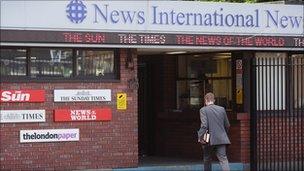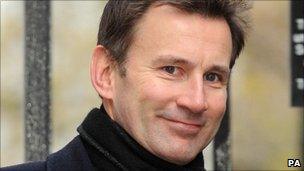Analysis: Murdoch and media ownership in UK
- Published

Vince Cable had been due to make the decision on Rupert Murdoch's bid for a greater share of BSkyB
Business Secretary Vince Cable has been relieved of some of his powers after being recorded telling undercover reporters he has "declared war" on Rupert Murdoch.
He said he used his powers to block News International's bid to take over full control of BSkyB. But what are the issues surrounding media ownership in the UK?
Media ownership has long been an area of political controversy - particularly when it involves Rupert Murdoch.
The idea of one man or company controlling a large proportion of the nation's newspaper and broadcasting interests is an issue of public concern - particularly when that person takes a close interest in the political agenda of his newspapers and one of them claims to influence general elections.
The famous headline "It's The Sun Wot Won It" appeared on the front page of The Sun on 11 April 1992 after it supported the Conservatives in the lead-up to their election victory.
It is generally accepted that freedom of speech is enhanced by having a diversity or plurality of editorial voices. There are legal restrictions on media ownership (at a local level, as well as national), and major takeovers are subject to scrutiny by regulators - provided the politicians give the go-ahead.
'Unprecedented merger'
Almost 30 years ago, Margaret Thatcher's government allowed Mr Murdoch's company to take over The Times and Sunday Times without referring it to the Monopolies and Mergers Commission (MMC), even though he already owned the Sun and the News of the World.
The former editor of the Sunday Times, Harold Evans, wrote: "A newspaper merger unprecedented in history went through in three days."
The decision was taken by the then Secretary of State for Trade, John Biffen, on the grounds the two papers were not going concerns and could close if the takeover were delayed by an MMC investigation.
The ruling was hotly criticised in Parliament and the press. Now, from confidential documents of the time (revealed after Freedom of Information requests), the BBC has learned more.
A minute of a meeting between the minister and Mr Murdoch on 2 February 1981 shows at that stage Mr Biffen wanted to refer the bid to the MMC as the best way to defuse criticism.
He later changed his mind.
Ten years later, in 1990, Mr Murdoch pre-empted formal scrutiny by the government and regulators by merging his heavily loss-making Sky TV with the equally loss-making British Satellite Broadcasting (BSB).
BSB had a licence from the Independent Broadcasting Authority, and should not have been taken over without a formal investigation.
Because both satellite companies were losing millions of pounds and could otherwise have closed, the merger was in effect a fait accompli and BSkyB was born - with Rupert Murdoch as its chairman.
Dominant position
Ever since, the Murdoch group in the UK has owned at least four national newspapers (briefly five, after he bought the ailing Today, which he later closed) as well as 39% of BSkyB. That has widely been seen by government and regulators as a "controlling" stake.
When BSkyB - under the chairmanship of Rupert Murdoch's son James - bought a 17.9% stake in ITV, the Department of Trade and Industry ordered a full competition inquiry, on advice from the Office of Fair Trading.

Culture and Media Secretary Jeremy Hunt will make a decision on the bid in the new year
After a lengthy legal process, the Competition Commission ordered BSkyB to reduce its stake. There have also been investigations recently into BSkyB's dominant position in the pay TV market, following complaints by Virgin and BT that it was harming their businesses.
These controversies have come to a head over the bid by Murdoch's News Corporation to buy the 61% of BSkyB shares it does not already own.
To many observers, the row has come as a surprise. When the deal was first proposed, most media commentators thought it would go through without much difficulty, subject only to agreement on price. They said owning all the shares would make little difference, given that James Murdoch was BSkyB's chairman and the 39% stake was widely seen as giving it control already.
But others argue this is a step too far. Since September, an unofficial campaign has escalated in the press and Parliament, arguing that the Murdoch empire would have significantly more power if it owned all the BSkyB shares.
'Financial clout'
Figures from Enders Analysis show that pay TV is growing in size and importance, and BSkyB has a huge share of that market. It now has 10 million subscribers in the UK and Ireland and revenues of £5.9bn, well ahead of the BBC's £3.6bn and ITV's £1.9bn.
The Enders report, sent to Mr Cable when he was responsible for deciding on the outcome of the bid, said BSkyB was already dominant in sport and films and could now extend this to other forms of programming.
It said: "BSkyB's huge financial clout means that it can buy up popular TV programmes from the US, placing them behind a paywall in the UK."
It said that if News Corporation owned all the shares, its UK group would be even larger and more powerful - and its news operations, including Sky News, could work more closely together.
Fears have also been expressed that Sky News could be turned into a right-wing, opinionated service like Fox News in the US - though Sky's own executives oppose this, believing that impartiality in news is a strength.
Rival media owners, including leaders of the Daily Telegraph and Daily Mail groups, the BBC, BT and Channel 4, wrote to Mr Cable urging him to refer the deal to regulators, on the grounds that the "proposed takeover could have serious and far-reaching consequences for media plurality".
Now the decision has been taken out of Mr Cable's hands and given to Culture and Media Secretary Jeremy Hunt who is more favourably disposed to Rupert Murdoch and his company.
On his website, the minister reproduces an interview in which he said Mr Murdoch had "probably done more to create variety and choice in British TV than any other single person, because of his huge investment in setting up Sky TV which, at one point, was losing several million pounds a day".
Mr Hunt has also said many people believe the Murdoch empire already controls BSkyB, and question whether a full takeover would make much difference. Some say this means he is almost certain to approve the bid - but he was careful to add he was not prejudging the issue, on which he will be advised by Ofcom.
Once again, the future of a major Murdoch takeover is in the hands of a government minister. We will know the outcome in the new year.
- Published21 December 2010
- Published21 December 2010